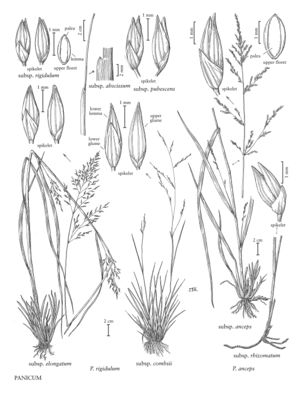Difference between revisions of "Panicum rigidulum subsp. pubescens"
FNA>Volume Importer |
imported>Volume Importer |
||
| Line 40: | Line 40: | ||
|publication year= | |publication year= | ||
|special status= | |special status= | ||
| − | |source xml=https:// | + | |source xml=https://bibilujan@bitbucket.org/aafc-mbb/fna-data-curation.git/src/bb6b7e3a7de7d3b7888a1ad48c7fd8f5c722d8d6/coarse_grained_fna_xml/V25/V25_1275.xml |
|subfamily=Poaceae subfam. Panicoideae | |subfamily=Poaceae subfam. Panicoideae | ||
|tribe=Poaceae tribe Paniceae | |tribe=Poaceae tribe Paniceae | ||
Revision as of 22:00, 27 May 2020
Culms less than 100 cm, usually slender, greatly compressed. Leaves mostly basal; sheaths narrower than those of subspp. elongatum and rigudulum, compressed, often pubescent, at least along the sides near the summit or at the throat; ligules 0.5-3 mm, membranous, usually fimbriate-ciliate; blades usually 2-7 mm wide, often folded or involute, usually pilose adaxially, at least near the base, bases about equal in width to the subtending sheaths. Panicles mostly terminal. Spikelets 2-2.7 mm, green or slightly purplish, set obliquely on the pedicels. Lower glumes about 1/2 as long as the spikelets; upper glumes slightly longer than the lower lemmas, acute; lower lemmas acute, the apices diverging slightly from those of the upper glumes.
Discussion
Panicum rigidulum subsp. pubescens grows primarily in moist pine savannahs, bogs, and other similar open, sandy habitats on the Atlantic and Gulf coastal plains of the United States.
Selected References
None.
